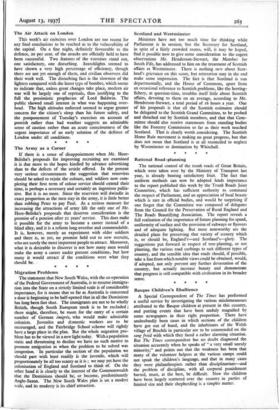The Army as a Career If there is a sense
of disappointment when Mr. Hore- Belisha's proposals for improving recruiting are examined it is due more to the hopes kindled by advance advertising than to the defects of the article offered. In the present very serious circumstances the suggestion that reservists should be asked to rejoin the colours, and soldiers now com- pleting their first term of colour service should extend their time, is perhaps a necessary and certainly an ingenious pallia- tive. But it is no more. Since the reservists will dwindle in exact proportion as the men stay in the army, it is little better than robbing Peter to pay Paul. As a serious measure for increasing the attractions of army life the only one of Mr. Hore-Belisha's proposals that deserves consideration is the promise of a pension after 21 years' service. This does make it possible for the army to become a career instead of a blind alley, and it is a reform long overdue and commendable. It is, however, merely an experiment with older soldiers and there is, as yet, no promise held out to new recruits, who are surely the most important people to attract. Moreover, what it is desirable to discover is not how many men would make the army a career under present conditions, but how many it would attract if the conditions were what they should be. • * * * *






































 Previous page
Previous page